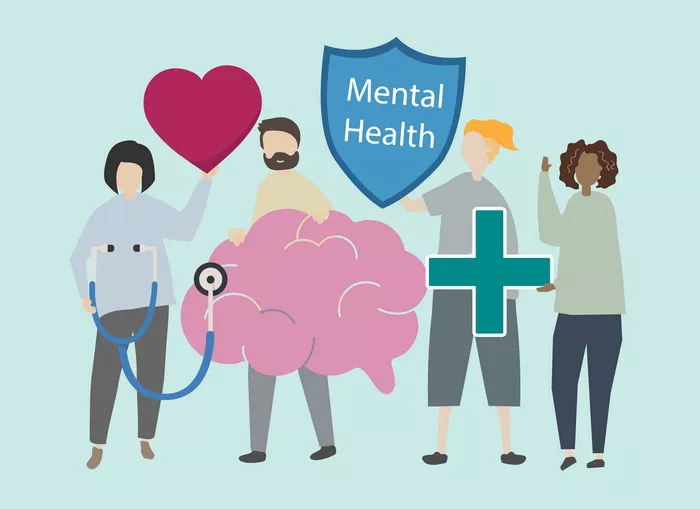Psychiatric disorders, also known as mental illnesses or mental health disorders, are conditions that affect a person’s thoughts, emotions, behaviors, and overall functioning. These disorders can have a profound impact on individuals’ lives, as well as on their families, communities, and society as a whole. While there are numerous psychiatric disorders recognized by mental health professionals, some are considered major psychiatric disorders due to their prevalence, severity, and significant impact on individuals’ lives. In this comprehensive article, we’ll explore the five major psychiatric disorders, including their symptoms, causes, diagnosis, and treatment options, to provide a deeper understanding of these complex conditions.
What Are Major Psychiatric Disorders?
Major psychiatric disorders are characterized by significant disturbances in mood, cognition, perception, and behavior that interfere with daily functioning and quality of life. These disorders are typically chronic and often require ongoing treatment and support to manage symptoms effectively. While there are many different types of psychiatric disorders, including anxiety disorders, personality disorders, and psychotic disorders, the five major psychiatric disorders commonly recognized by mental health professionals are:
1. Major Depressive Disorder (MDD)
4. Obsessive-Compulsive Disorder (OCD)
5. Post-Traumatic Stress Disorder (PTSD)
Let’s explore each of these disorders in more detail, including their symptoms, causes, diagnosis, and treatment options.
1. Major Depressive Disorder (MDD)
Major Depressive Disorder, commonly referred to as depression, is a mood disorder characterized by persistent feelings of sadness, hopelessness, and loss of interest or pleasure in activities. Other symptoms may include changes in appetite or weight, sleep disturbances, fatigue, feelings of worthlessness or guilt, and difficulty concentrating or making decisions. Depression can significantly impair functioning in various areas of life, including work, school, relationships, and self-care.
Causes of depression may include genetic factors, chemical imbalances in the brain, environmental stressors, trauma, and life events such as loss or trauma. Diagnosis is typically based on a thorough assessment of symptoms, medical history, and ruling out other possible medical conditions. Treatment options for depression may include psychotherapy, medication (such as antidepressants), lifestyle changes, and support from family, friends, and mental health professionals.
2. Bipolar Disorder
Bipolar Disorder, formerly known as manic-depressive illness, is a mood disorder characterized by episodes of mania and depression. During manic episodes, individuals may experience elevated mood, increased energy, impulsivity, and decreased need for sleep, while depressive episodes involve feelings of sadness, hopelessness, and low energy. Some individuals with bipolar disorder may also experience mixed episodes, which involve symptoms of both mania and depression simultaneously.
The exact cause of bipolar disorder is not fully understood but likely involves a combination of genetic, biological, and environmental factors. Diagnosis is based on a comprehensive assessment of symptoms, medical history, and family history. Treatment typically involves a combination of medication (such as mood stabilizers, antipsychotics, or antidepressants), psychotherapy, lifestyle changes, and support from mental health professionals.
3. Schizophrenia
Schizophrenia is a chronic and severe mental disorder characterized by disturbances in thinking, perception, emotions, and behavior. Common symptoms of schizophrenia may include hallucinations (perceiving things that aren’t real), delusions (false beliefs), disorganized thinking and speech, reduced motivation and emotional expression, and impaired social functioning. The onset of schizophrenia typically occurs in late adolescence or early adulthood and can have a profound impact on individuals’ lives.
The exact cause of schizophrenia is complex and multifaceted, involving genetic, environmental, and neurobiological factors. Diagnosis is based on a thorough evaluation of symptoms, medical history, and ruling out other possible medical conditions. Treatment options for schizophrenia may include antipsychotic medications, psychotherapy, supportive services, and rehabilitation programs to help individuals manage symptoms and improve functioning.
4. Obsessive-Compulsive Disorder (OCD)
Obsessive-Compulsive Disorder is an anxiety disorder characterized by recurrent, intrusive thoughts (obsessions) and repetitive behaviors or mental acts (compulsions) performed in response to these obsessions. Common obsessions may include fears of contamination, harm, or unwanted impulses, while compulsions may involve rituals such as handwashing, checking, or counting. OCD can significantly impair daily functioning and cause distress and interference in various areas of life.
The exact cause of OCD is not fully understood but likely involves a combination of genetic, neurological, and environmental factors. Diagnosis is based on a thorough assessment of symptoms, medical history, and ruling out other possible mental health conditions. Treatment for OCD typically involves a combination of cognitive-behavioral therapy (CBT), exposure and response prevention (ERP) therapy, medication (such as selective serotonin reuptake inhibitors), and support from mental health professionals.
5. Post-Traumatic Stress Disorder (PTSD)
Post-Traumatic Stress Disorder is an anxiety disorder that can develop after exposure to a traumatic or life-threatening event, such as combat, natural disasters, accidents, or interpersonal violence. Symptoms of PTSD may include intrusive memories or flashbacks of the traumatic event, avoidance of reminders of the trauma, negative changes in mood and cognition, and hyperarousal (hypervigilance, irritability, difficulty sleeping). PTSD can significantly impact individuals’ ability to function in daily life and can lead to impairments in relationships, work, and overall well-being.
The development of PTSD is influenced by a combination of genetic, biological, psychological, and environmental factors, as well as the nature and severity of the traumatic event. Diagnosis is based on a comprehensive assessment of symptoms, medical history, and exposure to trauma. Treatment for PTSD may include psychotherapy (such as cognitive processing therapy or eye movement desensitization and reprocessing), medication (such as selective serotonin reuptake inhibitors or other antidepressants), and support from mental health professionals.
Conclusion
The five major psychiatric disorders—Major Depressive Disorder, Bipolar Disorder, Schizophrenia, Obsessive-Compulsive Disorder, and Post-Traumatic Stress Disorder—represent a diverse range of conditions that can significantly impact individuals’ lives. These disorders vary in terms of their symptoms, causes, and treatment approaches, but they share a common theme of causing distress and impairment in daily functioning.
While each disorder presents its own unique challenges, it’s important to recognize that effective treatment and support are available for individuals living with psychiatric disorders. With early intervention, appropriate treatment, and ongoing support from mental health professionals, individuals with psychiatric disorders can lead fulfilling and meaningful lives. By raising awareness, reducing stigma, and promoting access to mental health resources, we can work towards improving the lives of individuals affected by psychiatric disorders and fostering a society that values and prioritizes mental health and well-being.
[inline_related_posts title=”You Might Be Interested In” title_align=”left” style=”list” number=”6″ align=”none” ids=”7234,7231,7281″ by=”categories” orderby=”rand” order=”DESC” hide_thumb=”no” thumb_right=”no” views=”no” date=”yes” grid_columns=”2″ post_type=”” tax=””]
































